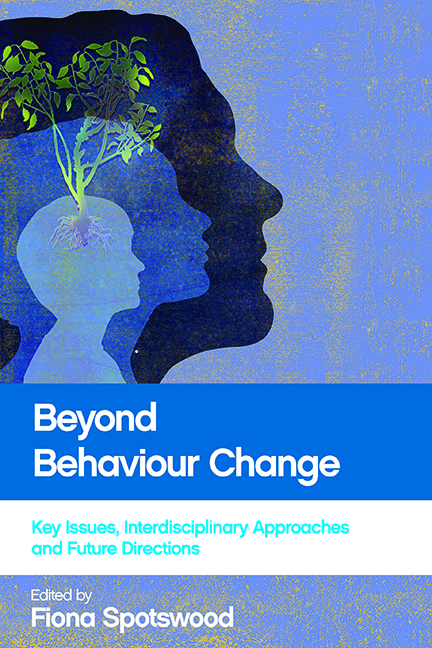fourteen - Conclusion: what is the future of ‘behaviour change’?
Published online by Cambridge University Press: 01 September 2022
Summary
Introduction
This book has provided insight into a range of areas that all come under the umbrella of ‘behaviour change’. The contributing authors come from a range of fields, including both academia and policy, and their expertise covers a variety of topic areas such as public health, energy, environmental management and transport. Some authors focus on tackling a specific societal problem and others are interested in policy or ideology more broadly. All, in one way or another, are involved in developing the ideas around ‘behaviour change’, but other than that they have little in common. In fact, some of the contentions within chapters clash or contradict each other. There are ideological, ethical, and theoretical disparities across this volume and as such it can be argued that far from this suite of chapters representing a cohesive behaviour change discipline, it has highlighted the fragmented nature of the field.
If ‘behaviour change’ is ever to be considered a cohesive field, it has a long way to go. On the one hand, like Cox and colleagues’ (2012) conclusions about strategic management, it can be argued that diversity in research simply represents the characteristic evolution of a discipline on its way to cohesion, and that through its maturity and refinement a field with such diverse roots has the potential to generate immense creativity and innovation. On the other hand, it may be that the nature of the disparity between potential members of this field will always prevent cohesion, and that this in itself – in a productive form – would form a particular route towards innovation and creativity. Either way, for the sake of improving our capability to tackle the momentous societal problems of our age, it is innovation and creativity that must be the goal of ‘behaviour change’ community members. As such, this concluding chapter argues for three shifts required in ‘behaviour change’ work on our way to achieving greater innovation and subsequent success.
The first is a move towards more systematically considering the interrelationship between broader societal forces – like the actions of business – and individual behaviour: a culturalist perspective. The second is a move towards a more blended, truly transdisciplinary focus, where disciplines focus not on their own priorities and achievements, but on the shared goal of making sustainable changes in society.
- Type
- Chapter
- Information
- Beyond Behaviour ChangeKey Issues, Interdisciplinary Approaches and Future Directions, pp. 283 - 298Publisher: Bristol University PressPrint publication year: 2016



